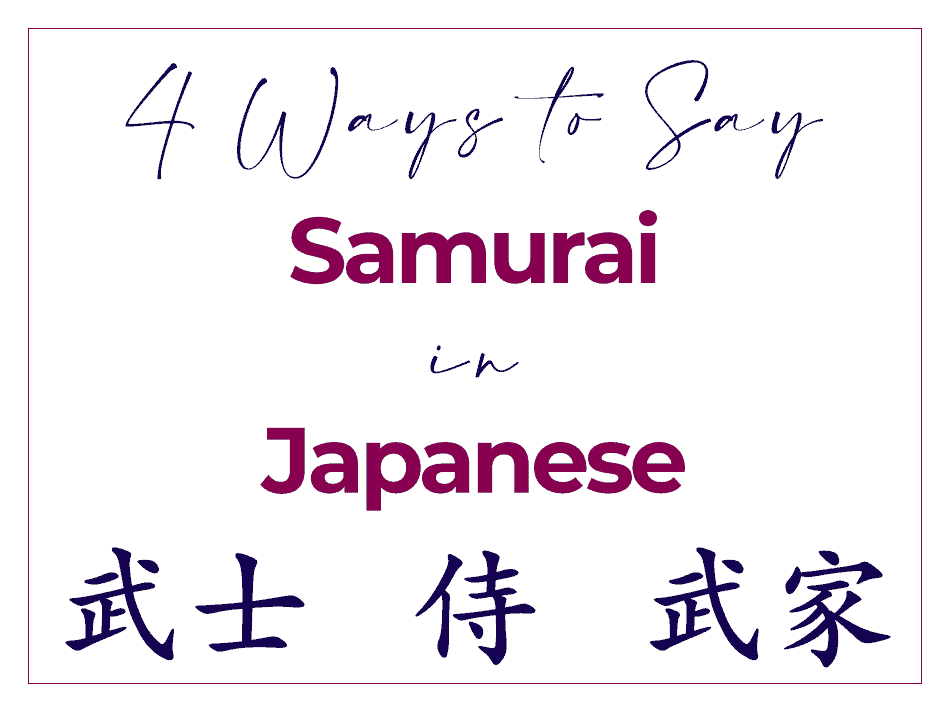I thought that answering the question of how to say “samurai” in Japanese would be one of the easiest blog posts to write for me. However, did you know that there are actually 4 Japanese words that can mean or be translated as “samurai“? Let’s take a look at their meanings and translations.
The classic Japanese word for “samurai” is also “samurai”, but it is written as 侍 in kanji and in hiragana as さむらい. It especially refers to the prestigious warriors that served the feudal lords (daimyo). Other common words are bushi (武士) and buke (武家), which translate as “samurai” or “warrior”.
This was just a quick answer, so read on when you want to know all 4 ways to say “samurai” in Japanese. I will explain each word in detail and point out all the important differences between their translations, meaning, how they were used in the past, and how they are used nowadays.
How to Say “Samurai” in Japanese
- samurai – 侍
- bushi – 武士
- buke – 武家
- shi – 士
1. Samurai – The Historical Japanese Word for “Samurai”
Kanji: 侍
Hiragana: さむらい
English Translation: samurai, warrior (who served daimyos)
Samurai (侍) is the historical or classic Japanese word for “samurai” since it especially refers to the well-paid, highly respected, and privileged military retainers of daimyos (feudal lords) during the Edo period. Nowadays, it has turned into a rather historical term that is not that commonly used anymore.
In Chinese, the original meaning of the kanji “侍” is to “wait upon” or to “accompany a person in the upper ranks of society” (source). It is the exact definition of a Japanese samurai since they served the nobility and fought for the aristocrats of the Edo period.
samurai
侍
samurai
warrior
2. Bushi – Japanese Word Meaning “Samurai” or “Warrior”
Kanji: 武士
Hiragana: ぶし
English Translation: samurai, warrior
The word bushi (武士) is another common way to say “samurai” or “warrior” in Japanese. However, bushi (武士) is actually a more general term that refers to a person or soldier who was armed with a sword and armor.
Among the armed warriors (bushi, 武士) there was a special military nobility or warrior class that served the feudal lords, and only they were called 侍 (samurai). However, nowadays the word bushi (武士) and the historic term samurai (侍) are often used interchangeably.
bushi
武士
samurai
warrior
3. Buke – Translates as “Samurai” or “Samurai family”
Kanji: 武家
Hiragana: ぶけ
English Translation: samurai, warrior, military family
The Japanese word buke (武家) translates as “samurai” and “warrior“, but the word can also refer to a “samurai family” or the “samurai lineage“. In the Edo period, the term was usually used to refer to a family that had an official samurai rank. These days, it is also used to refer to a samurai in general.
buke
武家
samurai
warrior
military family
4. Shi – Less Commonly Used Word and Kanji for “Samurai”
Kanji: 士
Hiragana: し、さむらい
English Translation: (well respected) man, soldier, warrior, samurai
Shi (士) is a Japanese word that has a couple of translations such as “(well respected) man“, “soldier“, and “warrior“, and it can also mean “samurai“. The kanji “士” also has two different readings. It can either be read as “shi” or as “samurai”.
The relation between the kanji “士” and the meaning “samurai” probably originates from the word bushi (武士). I think it is some kind of abbreviation that has been used in the past and continues until this day or that has been established in modern times.
The common reading of the kanji “士” is “shi” and in that case, it has the following meanings and translations:
shi
士
man (who is well respected)
soldier
warrior
samurai
When the kanji is read as “samurai” it has the following English translations and meanings:
samurai
士
warrior
samurai
How to Write 侍 – the Kanji for Samurai
This is not my own video. However, I thought it might still be interesting for you to see how to write the Japanese kanji 侍 stroke for stroke. It consists of 8 strokes.



With regards to: “…they served the nobility and fought for the aristocrats of the Edo period”
I’m no expert, by any stretch of the imagination; but I would argue the period you mean is the Sengoku Period. By the Edo period, samurai duties were mostly bureaucratic in nature, though they were able to retain the trappings of their status as samurai.
The Edo period was established with the Tokugawa Shogunate, and was the beginning of around 250 years of relative peace in Japan.
I’m not arguing samurai didn’t exist during the Edo Period, only that there was a marked decline of actual “fighting for” anyone during the time.
Hey Matt (⌒‐⌒)۶
I have to be honest, since this is not an article about Japanese history I didn’t really pay much attention to those details.
Please interpret “fighting for” as “standing up for someone” (e.g. “fighting for someone’s right”, “fighting for equality”).
But thanks for pointing that out and leaving a comment to clarify things for everyone! I really appreciate it!
If I have time I will rewrite the part so that it is 100% accurate.
It sounds like you know a lot about samurai 😉
Cheers,
Alex